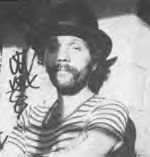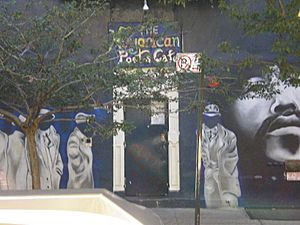Miguel Piñero facts for kids
Quick facts for kids
Miguel Piñero
|
|
|---|---|
 |
|
| Born | Miguel Antonio Gómez Piñero December 19, 1946 Gurabo, Puerto Rico |
| Died | June 16, 1988 (aged 41) New York City, New York, United States |
| Occupation | Playwright, actor |
| Nationality | Puerto Rican |
| Literary movement | Nuyorican Poets Café |
| Notable works | Short Eyes |
| Notable awards | New York Critics Circle Award, Obie Award, Drama Desk Award |
| Spouse | Juanita Lovette Ramirez (1977–1979) |
| Partner | Martin Wong |
| Children | Ismael Castro (adopted) |
Miguel Piñero (born December 19, 1946 – died June 16, 1988) was a talented writer and actor from Puerto Rico. He was also one of the people who helped start the Nuyorican Poets Café. Miguel Piñero was a key figure in the Nuyorican literary movement, which celebrated the experiences of Puerto Ricans living in New York City.
Contents
Early Life and Growing Up
Miguel Piñero was born on December 19, 1946, in Gurabo, Puerto Rico. His parents were Miguel Angel Gómez Ramos and Adelina Piñero. In 1950, when Miguel was four years old, his family moved to the Lower East Side of New York City, an area also known as Loisaida.
His father left the family in 1954. Miguel's mother then moved into a basement and received financial help to support the family. Miguel went to four different schools. He sometimes got into trouble and faced legal issues from a young age. He was sent to places like the Juvenile Detention Center in the Bronx.
When he was 13, he joined a street gang called "The Dragons." He later moved to Brooklyn and continued to get into trouble. He spent time in correctional facilities like Rikers Island. After this, he joined the Job Corps for training. He returned to New York City and became involved with the Young Lords, a group that worked for community improvement. He also spent time at Phoenix House and Manhattan State Hospital, where he earned his high-school equivalency diploma.
The Play Short Eyes
In 1972, when Miguel Piñero was 25, he was at a correctional facility called Sing Sing. While there, he wrote his first literary work, a poem called Black Woman with a Blonde Wig On. His play Short Eyes was also written during this time. He wrote it as part of a playwriting workshop for the people there.
A theater director named Marvin Felix Camillo helped Piñero. A writer for The New York Times, Mel Gussow, saw the play and wrote a review. This led to the play being shown at the Theater at Riverside Church.
When Piñero was released in 1973, he was able to present Short Eyes. The play is a drama that shares his experiences from his time in correctional facilities. In 1974, the play moved to Broadway thanks to theater producer Joseph Papp. It was first shown at Riverside Church, then The Public Theater, and finally the Vivian Beaumont Theater.
Short Eyes was a huge success. It was nominated for six Tony Awards. It won the New York Drama Critics Circle Award and an Obie Award for being the "best play of the year." The play was also popular in Europe. This success made Miguel Piñero a famous writer. Short Eyes was published as a book and was the first play by a Puerto Rican writer to be shown on Broadway.
Starting the Nuyorican Poets Café
In the 1970s, Miguel Piñero helped create the Nuyorican Poets Café. He started it with other artists and close friends, including Pedro Pietri and Miguel Algarín. The Café is a special place where poets and artists perform their work. It focuses on poetry about what it's like to be a Nuyorican, or a Puerto Rican living in New York City.
Acting and Writing for TV and Movies
In 1977, Miguel Piñero's play Short Eyes was made into a film. Robert M. Young directed it, and Piñero himself acted in the movie, playing a character named "Go-Go."
While working on the film, Piñero faced legal issues, but the accusations were later cleared. In the years that followed, Piñero acted in many films. Some of these include The Jericho Mile (1979), Times Square (1980), Fort Apache, The Bronx (1981), and Miami Vice (1984–1985).
He was known as a talented writer who showed the problems in society through his work. Piñero also wrote for television shows. He wrote an episode of Baretta in 1978 and acted in another episode in 1977. He also wrote the 1984 episode "Smuggler's Blues" for Miami Vice.
Other Plays and Writings
Miguel Piñero wrote many other plays after Short Eyes. His play Sideshow (1974) was about young people from the streets who decide to put on their own play. It showed how social workers tried to help teenagers find places to live and how the teens tried to fit in.
In 1976, his one-act play The Guntower premiered. This play was about two guards in a watchtower. That same year, he wrote The Sun Always Shines for the Cool (1976). This play followed the lives of different characters like players and thieves who meet in a bar.
In 1975, he moved to Philadelphia to act in a play called Steambath, where he played the role of God. His play Eulogy for a Small-Time Thief (1977) was set in Philadelphia. It was about a small-time thief who felt lost and thought he could control things around him.
Around 1979, he wrote two more one-act plays: Paper Toilet and Cold Beer. Paper Toilet takes place in a subway men's room. Cold Beer explores the role of a writer through a main character who is like Piñero himself.
Later Years and Legacy
Miguel Piñero became a close friend and writing partner to the artist Martin Wong. Piñero helped Wong learn about the Lower East Side of New York. Some of Wong's paintings show scenes from Piñero's poems and plays, like "The Annunciation According to Mikey Piñero (Cupcake and Paco)" (1984), which pictures a scene from Short Eyes.
Miguel Piñero passed away on June 16, 1988, in New York City due to health issues. As he wished in his 1985 "Lower East Side Poem," his ashes were scattered across the Lower East Side of Manhattan. His poem ended with these lines:
|
I want to climb up on a |
Before he died, Piñero was working on new plays. One unfinished play was called Every Form of Refuge Has Its Price, set in an intensive care unit. Another unfinished play was The Cinderella Ballroom.
Copies of Piñero's play The Guntower are kept in the Billy Rose Theatre Collection at the New York Public Library for the Performing Arts.
His Lasting Impact
The life of Miguel Piñero was shown in the 2001 Hollywood movie Piñero. The film was directed by Leon Ichaso and starred Benjamin Bratt as Piñero. The movie showed his life as a writer and person, blending visual and audio parts like slam poetry videos.
Poems like "January In Motion" and "The Bronx 1979" were written for Piñero by Neil Raymond Ricco. In 2022, Piñero was included in the book 50 Key Figures in Queer US Theatre, with a profile written by theater scholar Karen Jaime.
Awards and Recognitions
Miguel Piñero received several important awards for his work:
- 1974 Drama Desk Award, Outstanding New Playwright
- 1974 New York Drama Critics' Circle Award, Best American Play
- 1974 Obie Award, Best American Play
- 1975 Tony Award for Best Play
In 2013, Miguel Piñero was honored by being inducted into the New York Writers Hall of Fame.
His Works
Movies and TV Shows He Acted In
|
Plays He Wrote
|
See also
 In Spanish: Miguel Piñero para niños
In Spanish: Miguel Piñero para niños
- List of Puerto Ricans
- List of Puerto Rican writers
- Puerto Rican literature
- Pedro Pietri, co-founder of Nuyorican Poetry movement
- Miguel Algarín, co-founder of Nuyorican Poet's Cafe
- Latino literature
- Latino theatre in the United States
 | George Robert Carruthers |
 | Patricia Bath |
 | Jan Ernst Matzeliger |
 | Alexander Miles |


